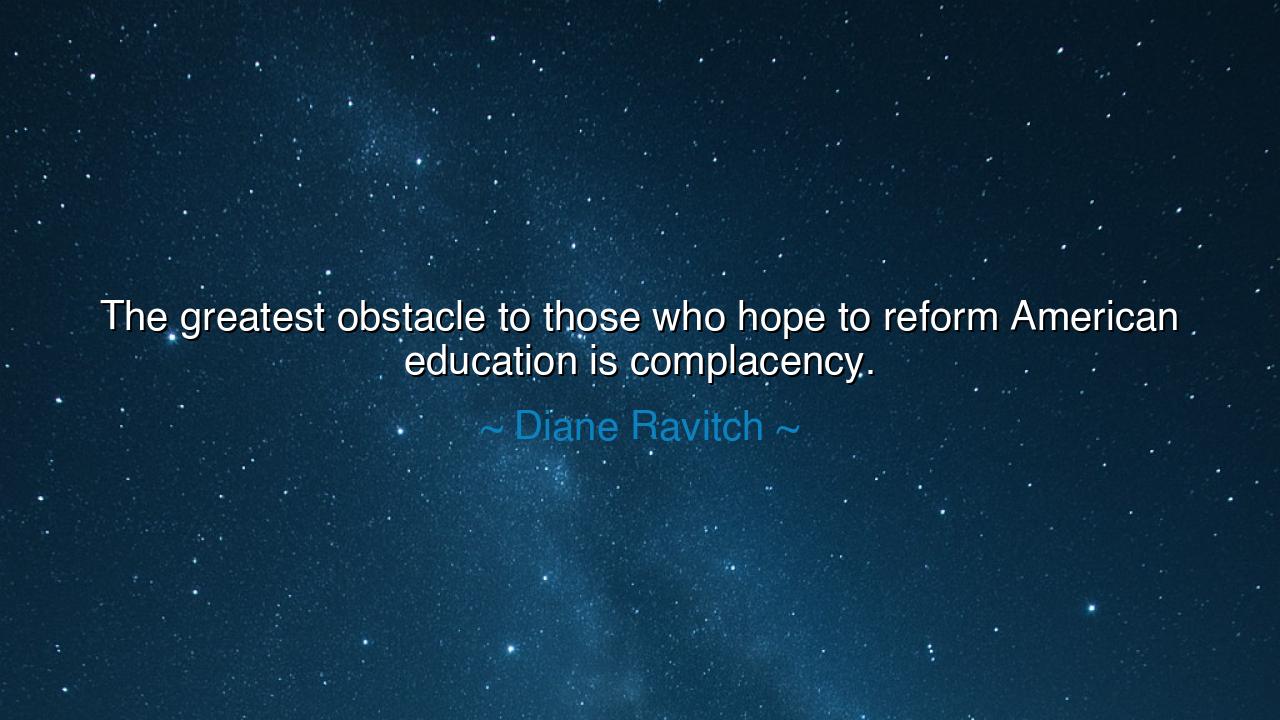
The greatest obstacle to those who hope to reform American






The words of Diane Ravitch, “The greatest obstacle to those who hope to reform American education is complacency,” rise like a trumpet’s call against silence — a warning that the enemy of progress is not ignorance, nor malice, but the comfort of inaction. Ravitch, herself once a policymaker and later a reformer, spoke from deep within the halls of education, where she saw that systems do not fall from corruption alone, but from the quiet decay of complacency — the belief that what exists is “good enough,” that tomorrow can wait, that problems are too vast to solve. Her words are not just for teachers or lawmakers, but for every generation that dares to dream of renewal yet risks falling asleep in the soft bed of acceptance.
In the manner of the ancients, we must understand that complacency is the most seductive of enemies. It comes not with sword or threat, but with comfort. It whispers, “Things are fine as they are,” even as the structure rots beneath us. In the realm of education, it is the slow poison that dulls the fire of inquiry, turning learning into routine, and schools into factories of conformity. Ravitch’s insight reminds us that true reform requires not only intellect, but restless moral energy — a heart unwilling to settle while others remain uninspired, unseen, or unequal.
To the ancients, such apathy would have been a form of decay within the soul. Aristotle taught that the purpose of education was not the filling of the mind, but the shaping of virtue and character — the creation of citizens capable of both reason and compassion. When education ceases to uplift, when it becomes mechanical, when it forgets the sacred duty to nurture the young spirit, civilization itself begins to weaken. Thus, Ravitch’s warning is not about schools alone; it is a warning about the spiritual health of a nation. When a society becomes complacent about how it teaches its children, it prepares its own decline.
Consider the story of Horace Mann, often called the father of American public education. In the early 19th century, he saw a land divided by class, where only the rich could afford learning. Yet he refused the comfort of complacency. He labored across states, facing ridicule and resistance, to create a system of free public schools, declaring that “education is the great equalizer.” Mann’s battle was not against ignorance alone, but against the apathy of those who said, “This is how it has always been.” He broke the silence, and through his persistence, an entire nation began to see that knowledge was not a privilege, but a right.
Ravitch’s words stand in this same tradition. She reminds us that reform is not born from the comfortable, but from the dissatisfied — those who love enough to question, who care enough to challenge the stagnant current. To hope for reform is easy; to fight complacency is sacred labor. It demands courage to confront bureaucracies, humility to listen to teachers and students, and patience to build systems that serve not merely the powerful, but the forgotten. It demands that we never say, “Good enough,” when a single child’s potential remains untended.
Complacency also thrives not just in institutions, but in the hearts of individuals. How many of us, having received education, no longer seek to learn? How many parents, distracted by life’s noise, no longer ask what their children are taught or how they are inspired? Education dies not in policy alone, but in the absence of curiosity. To reform it, we must awaken the spirit of lifelong learning — to see every day, every challenge, every failure as a classroom in which we are still students.
So let this teaching descend upon the mind like rain upon dry soil: never be content with the way things are when the way things could be is brighter. Question systems, question traditions, and most of all, question your own indifference. For as Ravitch teaches, the death of education does not come from enemies outside, but from silence within. The cure is vigilance — a burning hope joined with tireless action. Each generation must lift the torch higher than the last, lest the light grow dim.
And thus, the lesson endures: complacency is the slow death of every good thing, but the will to improve — to reform, to care, to teach — is life itself. Guard that will as sacred. Nurture it as the ancients nurtured the flame of knowledge. For a society that refuses to be complacent about its children will never fade into darkness — it will rise, generation after generation, renewed by its own unending hunger to learn.






AAdministratorAdministrator
Welcome, honored guests. Please leave a comment, we will respond soon